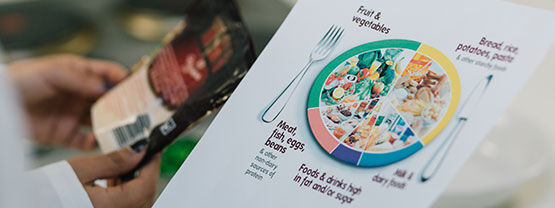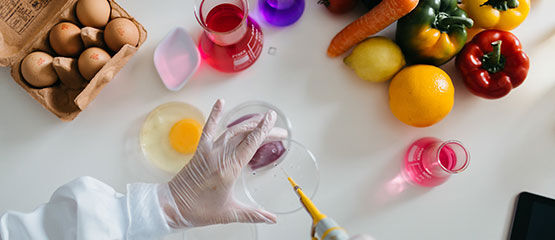Have you ever considered following a vegetarian diet, but are unsure if it could be right for you? If so, our blog written by Emma Angeletti, a BSc (Hons) Food and Nutrition student, will give you some insights into the benefits of going meat-free, and provide you with top tips on foods to keep you nutritionally balanced.
I decided to stop eating meat well over three years ago (before moving to the UK from Italy to start my degree), and I now follow a pescatarian diet. This means eating a vegetarian diet, but with the inclusion of fish and seafood. If you are considering a move towards a vegetarian diet, I hope my experiences can give you some food for thought!
Environmental and ethical benefits
Although my reasons for not eating meat weren’t strictly ethical at first, both my personal research and the knowledge I’ve gained since starting my studies on the BSc (Hons) Food and Nutrition degree have helped me to understand more about the ethical and environment benefits of following a vegetarian diet. In short, reducing our meat and animal product consumption can be beneficial to our planet (as well bringing us health benefits). Livestock, just like us humans, need copious amounts of food and water to survive, which results in increased greenhouse gas emissions (and cows are notorious for their methane production!) and this is contributing to increased levels of pollution and global warming. Large-scale meat farming requires over double the amount of land needed to grow fruit and vegetables, which in turn leads to deforestation when space isn't sufficient. Therefore, eating a vegetarian diet could help you save the planet!
My reasons for going meat-free
When I first stopped eating meat, it was mostly because I simply no longer enjoyed the flavour and I noticed the texture was becoming off-putting to me. I found myself no longer buying it or featuring it on my shopping list, and I avoided ordering anything with meat in at restaurants, and was only eating it once or twice a month. My last meat-based meal was a Christmas turkey dinner, after which I decided to go meat-free for good in the New Year. However, I did make a few mistakes at first.
Meat-free alternatives
I wasn’t as well educated on food and nutrition as I am now (thanks in part due to my studies), so I thought cheese and dairy were the only foods I could use as substitutes. That meant I was eating way too much dairy and I ran into problems, including bad skin and poor digestion. At the time, I was in a relationship with someone who followed a completely vegan diet, so he introduced me to the amazing world of plant-based protein sources which, contrary to some people’s beliefs, isn’t just about tofu.
That's when I really started to learn more and experiment with different plant-based protein-rich foods. I discovered seitan (pronounced say-tan), which is a gluten-based wheat product, and a good alternative if you can’t have soy-based products, such as tofu (bean curd) or tempeh (cooked fermented soybeans), which are great sources of protein.
Furthermore, I started eating more pulses, like lentils, beans and chickpeas, which are also rich in fibre, which really helped me manage my poor digestion at the time. I didn’t entirely cut dairy out of my diet, I simply made sure I wasn’t eating it daily and chose lower fat options, such as cottage cheese or Greek yogurt, whilst also introducing dairy alternatives, such as almond milk and soya yogurt.
I also started eating eggs more often, as they are a healthy, versatile and inexpensive source of high biological value protein. As I was still living in Italy, which is my home country, I found it even easier to follow a more plant-based approach to eating, as we’re lucky enough to have the perfect climate for harvesting amazing quality and varieties of fresh fruit and vegetables.
Interestingly enough, vegetarianism actually first originated in ancient Greece, and nowadays the Mediterranean diet is still considered one of the healthiest and one of the best ways to prevent or manage cardiovascular disease.

The positive impact
After a few months, I really started to notice the positive impact that going meat-free had on my health. First off, my skin cleared up and I wasn’t feeling as bloated or lethargic. I also found myself naturally gravitating towards healthier foods in general, such as whole grain bread, rice and pasta. I also started eating way more fresh produce. I had a lot more energy and even lost a few pounds without trying that hard.
When I moved to England for university, I found that eating no meat made it much easier to keep my budget affordable too. As I gained more independence and went to live on my own, I also started to experiment with different recipes, trying to make popular meals meat free. One of my staple dishes is meatless bolognese sauce, which I make by substituting beef mince with lentils, crumbled up tofu or soya mince, which you can find in most health food stores pretty inexpensively. I also enjoy making vegan alternatives to baked goods, by substituting butter with plant-based unsaturated fats like sunflower oil, and even using pureed fruit such as bananas or apples to replace eggs.
One thing that helped me when I was trying to cut down on meat, was finding healthy and affordable alternatives. Some of my favourites are Linda McCartney sausages, Quorn, tofu, seitan, tempeh and pulses. Not only do these products taste amazing but they and can be used in so many recipes. They provide just as much if not more protein than meat. You should take into account that aside from soy, plant-based protein sources don’t have all the essential amino acids so pairing them with whole grains, such as brown rice, will ensure you get a complete amino acid profile. These protein sources are also low in fat, especially saturated fat, commonly high in meat. As fat is an important macronutrient for a balanced diet, I recommend increasing the amounts of unsaturated fats, such as olive oil, avocado and nuts in your diet, which is my excuse to indulge in peanut butter on a regular basis!
Eating out is still an option
Being vegetarian does not mean you can no longer go out to eat or order takeaways. Nowadays, most restaurants have options for everyone, and sometimes the veggie options can be cheapest. Some of my favourite types of food are Greek, Italian and Indian, all of which have amazing vegetarian options – honestly, if you haven’t had halloumi you haven’t lived!
All in all, I can confidently say that three years on I don’t miss eating meat at all and have never felt healthier. I have learned so much about all the amazing plant-based foods and how they can be used and that you don't necessarily need meat to have a balanced diet.







